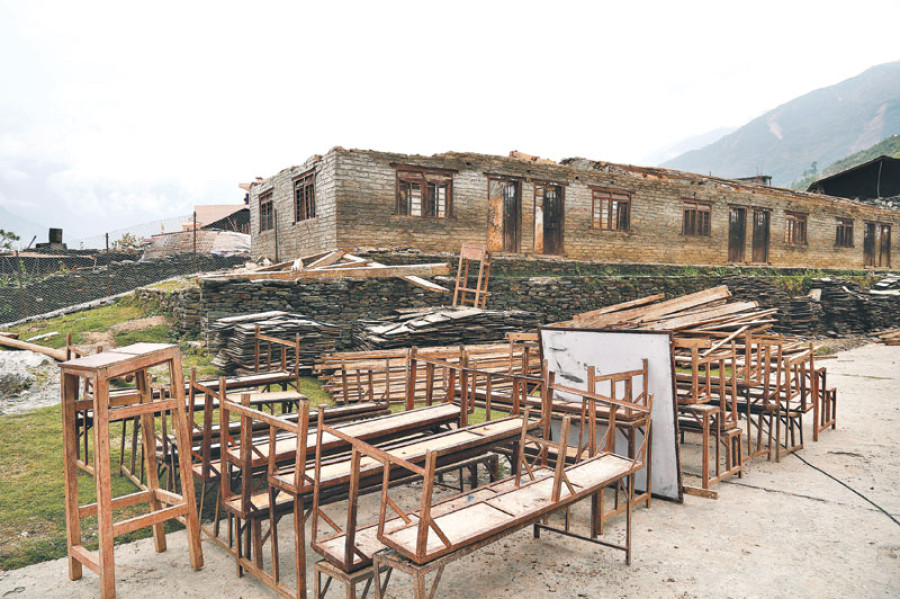Miscellaneous
School reconstruction set to begin from Lalitpur
The government is planning to start reconstruction of earthquake-ravaged school buildings from Lalitpur on the eve of the first anniversary of the April 25 earthquake with support from donor agencies.
The government is planning to start reconstruction of earthquake-ravaged school buildings from Lalitpur on the eve of the first anniversary of the April 25 earthquake with support from donor agencies.
The donors so far have committed Rs2.12 billion ($200 million) which is just enough to rebuild around 1,700 schools. The Ministry of Education records show around 17,000 classrooms of 7,900 public schools were destroyed by the April 25 quake and its aftershocks which also inflicted damage on more than 20,000 classrooms. Around a million students were directly affected as they missed 26 school days after the earthquake. Having completed the planning for the reconstruction work, the ministry is scheduled to implement it in two months. The National Reconstruction Authority too plans to formally commence the reconstruction on the same day.
Two donor agencies—the Asian Development Bank and the Japan International Cooperation Agency (JICA)—have each signed an agreement for $100 million for the project. Similarly, an additional commitment of over Rs 1.5 billion has been made for 466 schools by various local organisations and NGOs. In the Post Disaster Needs Assessment report, the government had set a target to complete the entire reconstruction works within two years. However, delay in the formation of the NRA and capitalising on the pledge made by the donors mean it would take at least three years to complete the reconstruction.
According to chief at Department of Planning at the ministry Lava Deo Awasthi, owing to the lack of sufficient funds the government is set to launch the school reconstruction project only in 14 worst affected districts in the first phase. Around 4,000 school buildings were destroyed by the disaster in those districts. The earthquakes in April 25 and May 12 affected 31 districts of the country. “The present commitment is just enough for the reconstruction of around half of the schools from 14 worst affected districts,” said Awasthi.
Property worth Rs 28.9 billion was destroyed in the education sector. The government estimates the equal amount of money will be required to rebuild all the schools and colleges, including the private ones. The ministry plans to complete 20 percent of the reconstruction works in the first year and 40 percent each in the next two years.
Rs 480m EU support for education sector
The European Union (EU) has released Rs480million (€4.1 million), taking its total support to the government of Nepal to Rs3.7 billion under the School Sector Reform Programme (SSRP).
“The education sector suffered very badly due to the earthquakes and also the agitation later in 2015 and needs specific attention during the reconstruction phase.
The EU is already providing 650 Transitional Learning Centres and this budget support can further help to bring the sector back on track,” EU Ambassador to Nepal Rensje Teerink said in a statement.
This payment by the EU is the third fixed tranche of its current budget support to the Education sector totaling €31.2 million (approx Rs3.7 billion). Nepal’s SSRP is the latest in a series of comprehensive programmes to support the development of education in Nepal.
The EU’s support contributes to poverty reduction and the socio-economic development in Nepal by raising educational access and achievements of the young generation on an equitable basis. The SSRP focuses on improving access to quality education at early childhood, basic and secondary levels, particularly for children from marginalised groups.
It is a collective effort which brings together key stakeholders—government, teacher and parent organisations, civil society and development partners—with an aim to enhance coordination, impact and results of the reform programme.
Education is one of the focal areas of EU Nepal cooperation and will be scaled up and also broadened to technical and vocational training during the 2014-2020 period, said the statement.




 12.12°C Kathmandu
12.12°C Kathmandu







%20(1).jpg&w=300&height=200)

